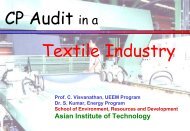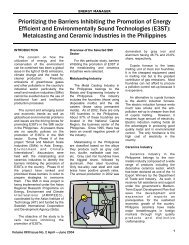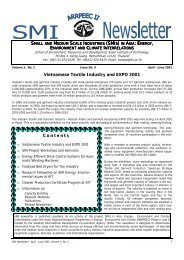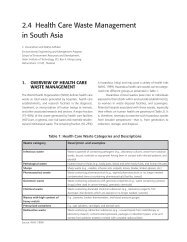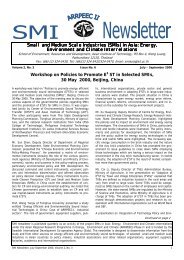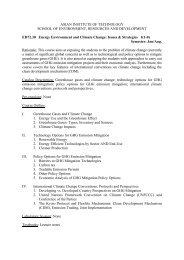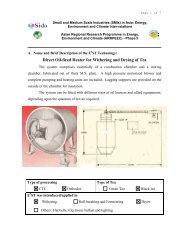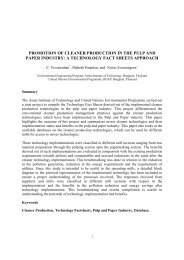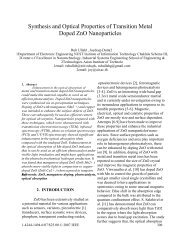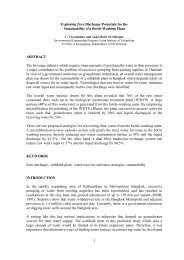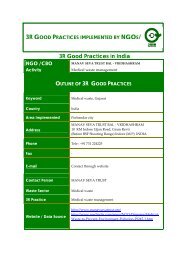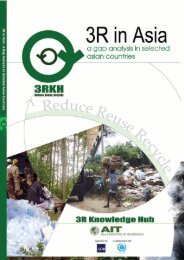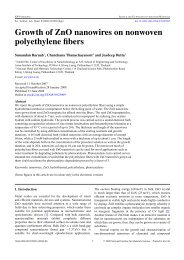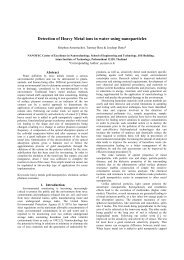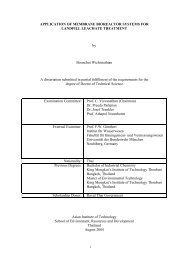Evaluation of Plastic Waste Management in Thailand Using Material ...
Evaluation of Plastic Waste Management in Thailand Using Material ...
Evaluation of Plastic Waste Management in Thailand Using Material ...
Create successful ePaper yourself
Turn your PDF publications into a flip-book with our unique Google optimized e-Paper software.
The amount <strong>of</strong> plastic waste for recycl<strong>in</strong>g <strong>in</strong> 2010 decreased compared to <strong>in</strong> 2005 because<br />
this amount was estimated by the calculation through the assumed recycl<strong>in</strong>g rate (14%).<br />
However, the actual amount <strong>of</strong> plastic waste for recycl<strong>in</strong>g which was reported by PCD was<br />
506,780 tonnes <strong>in</strong> 2010 (PCD, 2010). The <strong>in</strong>crease <strong>of</strong> plastic waste recycl<strong>in</strong>g <strong>in</strong> 2010<br />
confirms the <strong>in</strong>crease <strong>of</strong> recycl<strong>in</strong>g rate <strong>of</strong> plastic waste from 11% <strong>in</strong> 2005 to 14% <strong>in</strong> 2010.<br />
The activities <strong>of</strong> stakeholders regard<strong>in</strong>g to plastic waste management <strong>in</strong> <strong>Thailand</strong> consisted<br />
<strong>of</strong> consumers, waste pickers, waste shops, recyclers, waste exporters, and policy maker. In<br />
2005, there was not any plastic waste export, but 205,790 tonnes <strong>of</strong> plastic wastes was<br />
exported <strong>in</strong> 2010. In 2008, there are 10,200 waste shops <strong>in</strong> <strong>Thailand</strong> (PCD, 2013). <strong>Waste</strong><br />
shops collect and sell their waste to recyclers, and they are the one important stakeholder to<br />
<strong>in</strong>crease the recycl<strong>in</strong>g rate <strong>of</strong> plastic wastes. They can collect 5 tonnes/month <strong>of</strong> plastic<br />
waste (field observation, 2013).<br />
In 2005, the environmental plan promoted to <strong>in</strong>crease the recycl<strong>in</strong>g rate by 30% with<strong>in</strong><br />
2011, but this goal was not successful because consumers did not concern on the<br />
environmental problems and know any project and policy (Chanchampee, 2010).<br />
Currently, the environmental plan <strong>in</strong> 2012 also promoted the 3Rs pr<strong>in</strong>ciple to <strong>in</strong>crease <strong>in</strong><br />
recycl<strong>in</strong>g rate by 30% with<strong>in</strong> 2016, and to reduce the waste generation per capita (less than<br />
1 kg/capita/day) (MNRE, 2012). This plan may be successful if people concern and<br />
participate to reduce, reuse and recycle plastic wastes. The networks <strong>of</strong> stakeholders help<br />
to achieve the goals <strong>of</strong> policy because not only one stakeholder try to improve the best<br />
practice on plastic waste management, but all relevant stakeholders also participate the<br />
project.<br />
The disposal methods for plastic wastes <strong>in</strong> 2005 <strong>in</strong>cluded <strong>in</strong>c<strong>in</strong>eration and landfill<strong>in</strong>g.<br />
There was one <strong>in</strong>c<strong>in</strong>erator to recovery energy from plastic wastes, and less than 0.2% <strong>of</strong><br />
plastic waste was burnt <strong>in</strong> the municipal <strong>in</strong>c<strong>in</strong>erators. Two-third <strong>of</strong> plastic wastes was<br />
disposed at landfill. Similarly 37% <strong>of</strong> municipal plastic wastes were disposed at landfill<br />
sites <strong>in</strong> 2010. In 2010, <strong>in</strong>dustrial plastic wastes were usually burnt at the <strong>in</strong>dustrial<br />
<strong>in</strong>c<strong>in</strong>eration or cement kiln, but only 2% <strong>of</strong> municipal plastic waste generation was burnt <strong>in</strong><br />
at the municipal <strong>in</strong>c<strong>in</strong>eration (PCD, 2010). F<strong>in</strong>ally, uncollected wastes and improper<br />
disposal wastes became the challenge for the improvement <strong>of</strong> plastic waste management <strong>in</strong><br />
<strong>Thailand</strong>.<br />
4.3 Prediction <strong>of</strong> <strong>Plastic</strong> <strong>Waste</strong> <strong>Management</strong> <strong>in</strong> 2016<br />
4.3.1 <strong>Plastic</strong> waste management scenarios<br />
The plastic waste management scenarios were proposed to f<strong>in</strong>d the possible waste<br />
management options. There are four proposed scenarios followed by the exist<strong>in</strong>g plans and<br />
policies such as the National Environmental Quality Control Plan <strong>in</strong> 2012-2016 and the<br />
alternative energy development plan <strong>in</strong> 2012-2021. The first scenario is the bus<strong>in</strong>ess as<br />
usual (BAU) <strong>of</strong> plastic waste management <strong>in</strong> 2016. The second scenario was proposed to<br />
<strong>in</strong>crease <strong>in</strong> recycl<strong>in</strong>g rate by 30%, and the last scenario related to the <strong>in</strong>crease <strong>of</strong> energy<br />
recovery by <strong>in</strong>c<strong>in</strong>eration and oil recovery.<br />
The first scenario related to the bus<strong>in</strong>ess as usual. The bus<strong>in</strong>ess as usual means that the<br />
future view <strong>of</strong> current situation will be not change because everyth<strong>in</strong>g will be done <strong>in</strong> the<br />
69



